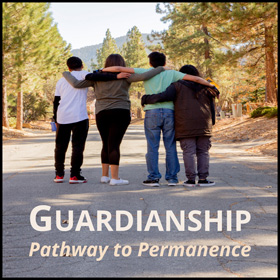Every child and youth deserves the chance to grow up in a family that can provide them with love, hope, and stability. In North Carolina, when a child or youth is in foster care and neither reunification with birth parent or primary caregivers nor adoption is a good fit, legal guardianship is another way to find a forever home.
Unlike adoption, guardianship does not require a child to be legally free. A child becomes legally free when the courts terminate parental rights (TPR), a legal process that means birth parents or primary caregivers no longer have the right to make decisions for their child. TPR is required for adoption, but not legal guardianship, making guardianship a good option when it is in the child’s best interests to stay connected to their birth parent/primary caregivers.
North Carolina offers support to families created through guardianship. KinGAP, or the Kinship Guardianship Assistance Program, is one such support. This program offers financial assistance and Medicaid to those who meet eligibility requirements.
To make sure North Carolina’s resource parents have the information they need if they are ever asked to consider guardianship, FosteringNC.org now features the free, 1-hour course Guardianship, Pathway to Permanence.
This course can also help you earn the training credit you need to renew your North Carolina foster home license. (Note: check with your agency first to ensure they will count this training toward your relicensure.) To take Guardianship, Pathway to Permanence, visit https://fosteringnc.org/on-demand-courses/#guardianship.


